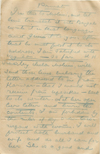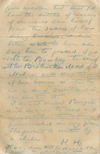Mahatma Letter to Mohini - LMW 2 No. 61
| Quick Facts | |
|---|---|
| People involved | |
| Written by: | Koot Hoomi |
| Received by: | Mohini Mohun Chatterji |
| Sent via: | H.P.B. or H.S.O. |
| Dates | |
| Written on: | unknown |
| Received on: | 1882 |
| Other dates: | unknown |
| Places | |
| Sent from: | unknown |
| Received at: | unknown |
| Via: | unknown |
This letter is Letter No. 61 in Letters from the Masters of the Wisdom, Second Series. Mahatma Koot Hoomi gives Mohini Mohun Chatterji the task of translating a letter into Bengali.[1]
< Prev letter in LMW 2
Next letter in LMW 2 >
Page 1 transcription, image, and notes
|
Private. Give this to Mohini, and let him translate it into Bengali[,] write it in that language and give it to you. After that he must post it to its address. I am satisfied with my son — so far.
[Transcription] My chela Mohini will send these lines enclosing the letter addressed to me from Kariwar – that I would not receive from Upasika – back to its writer. Let her open her letter and burn the contents. I am forbidden by the rules of my Order to correspond with women. I will protect both husband and wife, and do all I can for her. She is a good and |
NOTES:
|
Page 2
|
NOTE:: bold text represents text that was omitted in the published version. pure woman but must follow the dictates of reason if she would save herself from the snares of her many enemies. Mohini better write to her, advising her to proceed, if possible to Bombay to see, if not her Brother then Mad B. Mohini will keep the fact of her having written to me a dead secret and never write it. I do not know Bengali and in order to read and [illegible – possibly "translate"] have to exercise powers which are very precious. The present is written by a chela.
It is my desire that he should put his full name to what he writes. |
NOTES:
|
Context and background
Mr. Jinarajadasa provided this foreword to the letter:
ONE of the band of brilliant Indians who have helped in taking Theosophical ideas to Western lands is Mohini Mohan Chatterjee. When he was drawn to Theosophy in 1882, he was equipped with an unusually keen philosophical mind. He was accepted by the Master К. H. as a pupil, and much was expected of him. About 1886, however, after splendid Service, he fell out with H.P.B., and bit by bit lost his interest in the T.S.
Mr. Mohini M. Chatterjee left for Europe with the Founders in February, 1884. He rendered valuable aid with lectures and discourses both in Paris and London, and many European Theosophists still remember the brilliance of presentation of spiritual truths by the young Hindu. He visited America the next year. The letters which follow are at Adyar. In Letter 58, reference is made to the “Christian pernicious Superstition". The Masters objected, in popular Christianity, to the emphasis it laid on one life, with the resulting greed and scramble to crowd all experiences into that one life, as also to the intensification of the fear of death, and the consequent heightening of the struggle for existence for all. Equally emphatic was Their denunciation of а “ personal God," as presented in exoteric Christianity, which made men lose in self-reliance, and taught them to look outside of themselves to achieve that reformation of their nature which is the prelude to true peace and happiness. (See Letter I, First Series, for the standpoint of the Maha Chohan on Western civilisation.)[2]
Of this letter [Curuppumullage Jinarājadāsa|Mr. Jinarajadasa]] wrote:
Letter evidently was received by H.P.B. or H.S.O. and forwarded to M.M.C.[3]
Physical description of letter
Mr. Jinarajadasa wrote of the Mohini letters:
The letters which follow are at Adyar.[4]
Publication history
This letter was first published as Letter No. 61 in Letters from the Masters of the Wisdom, Second Series.
Commentary about this letter
Madame Blavatsky had forwarded a letter to KH from a wife who was evidently in trouble. KH calls the wife "a good and pure woman" and promises to protect the wife and her husband. He seems to know something of the contents of the letter without having opened the envelope. Since KH was not allowed to correspond with any women, he instructs Mohini to write to the wife. She should open and burn the letter she had sent via HPB, and then proceed from Kariwar to Bombay. There she should consult with "her Brother" or HPB (Mad B).
The reason for translating into Bengali is unclear. Presumably the wife knew that language, but if she lived in the Kariwar that is in Karnataka, it is more likely that her everyday tongue would be Kannada. Perhaps there was another town with a similar name in a Bengali district.
The identity of the wife is also unclear. The correspondence of HPB in 1882 involves only two married couples – the Sinnetts and the Gordons, who were all English.

